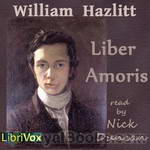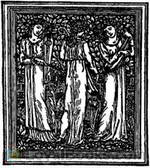|
Books Should Be Free Loyal Books Free Public Domain Audiobooks & eBook Downloads |
|
|
Books Should Be Free Loyal Books Free Public Domain Audiobooks & eBook Downloads |
|
Poetry |
|---|
|
Book type:
Sort by:
View by:
|
By: William Cowper (1731-1800) | |
|---|---|
 Inscription For A Stone
Inscription For A Stone
volunteers bring you 18 recordings of Inscription For A Stone by William Cowper. This was the Weekly Poetry project for May 12, 2019. ------ INSCRIPTION FOR A STONE Erected at the sowing of a grove of oaks at Chillington, the Seat of T. Giffard, Esq, 1790 | |
By: William Cullen Bryant (1794-1878) | |
|---|---|
 Journey of Life
Journey of Life
LibriVox volunteers bring you 14 recordings of The Journey of Life by William Cullen Bryant. This was the Weekly Poetry project for December 23, 2012.William Cullen Bryant was an American romantic poet, journalist, and long-time editor of the New York Evening Post. His poetry has been described as being "of a thoughtful, meditative character, and makes but slight appeal to the mass of readers." ( | |
 Midsummer
Midsummer
LibriVox volunteers bring you 14 recordings of Midsummer by William Cullen Bryant. This was the Weekly Poetry project for June 23, 2013.This poem taken from the Poetical Works of William Cullen Bryant, Household Edition. | |
By: William Dean Howells (1837-1920) | |
|---|---|
 The Daughter of the Storage And Other Things in Prose and Verse
The Daughter of the Storage And Other Things in Prose and Verse
| |
 Poems
Poems
| |
By: William Ernest Henley (1849-1903) | |
|---|---|
 Poems
Poems
| |
 Lyra Heroica A Book of Verse for Boys
Lyra Heroica A Book of Verse for Boys
| |
 Hawthorn and Lavender with Other Verses
Hawthorn and Lavender with Other Verses
| |
 The Song of the Sword and Other Verses
The Song of the Sword and Other Verses
| |
By: William Hazlitt (1778-1830) | |
|---|---|
 Liber Amoris
Liber Amoris
Liber Amoris is unlike anything Hazlitt wrote and probably like nothing you've come across before. On the face of it it tells the story of Hazlitt's infatuation with his landlords daughter. Hazlitt was middle aged and she young and pretty, a bit of a coquette from the sound of it. It turned out badly for Hazlitt and the book tells the story of this doomed love. Critics have always been divided about the merit of the piece. Even those who see its merit often feel more comfortable with his polished literary works, and perhaps rightly so... | |
By: William Henry Davies (1871-1940) | |
|---|---|
 Foliage: Various Poems
Foliage: Various Poems
W. H. Davies was a Welsh poet and writer. Davies spent a significant part of his life in the United Kingdom and United States, becoming one of the most popular poets of his time. Davies is usually considered one of the Georgian poets, although much of his work is atypical of the style and themes adopted by others of the genre. | |
By: William Henry Drummond (1854-1907) | |
|---|---|
 The Habitant and Other French-Canadian Poems
The Habitant and Other French-Canadian Poems
| |
 The Voyageur and Other Poems
The Voyageur and Other Poems
| |
By: William J. Lampton (1851-1917) | |
|---|---|
 Flag and the Faithful
Flag and the Faithful
LibriVox volunteers bring you 12 recordings of The Flag and the Faithful by William J. Lampton. This was the Weekly Poetry project for January 20, 2013.William J. Lampton was the second cousin of Jane Clemens (the youngest of the three daughters of Samuel Langhorne Clemens, better known by his pen name Mark Twain.)He launched his jounalist carreer in 1877 by starting the Ashland (Kentucky) Weekly Review, with his father’s money. Lampton wrote several book, as well as humorous poems he called 'yawps'. These were printed in the New York Sun and published in Yawps and Other Things ca. 1900. | |
By: William Johnson Cory (1823-1892) | |
|---|---|
 Ionica
Ionica
| |
By: William Lisle Bowles (1762-1850) | |
|---|---|
 The Poetical Works of William Lisle Bowles Vol. 2
The Poetical Works of William Lisle Bowles Vol. 2
| |
By: William Makepeace Thackeray (1811-1863) | |
|---|---|
 Ballads
Ballads
| |
 The Loving Ballad of Lord Bateman
The Loving Ballad of Lord Bateman
| |
By: William Morris (1834-1896) | |
|---|---|
 The Tale of Beowulf Sometime King of the Folk of the Weder Geats
The Tale of Beowulf Sometime King of the Folk of the Weder Geats
| |
 The Earthly Paradise
The Earthly Paradise
| |
 Chants for Socialists
Chants for Socialists
As well as being influential in the Arts and Crafts Movement and writing numerous poems and novels, William Morris was deeply involved in political reform. These poems, the earliest of which were first collected in 1885, reflect his socialist beliefs. | |
By: William Roscoe (1753-1831) | |
|---|---|
 The Peacock 'At Home' AND The Butterfly's Ball AND The Fancy Fair
The Peacock 'At Home' AND The Butterfly's Ball AND The Fancy Fair
| |
By: William Shakespeare (1564-1616) | |
|---|---|
 The Passionate Pilgrim
The Passionate Pilgrim
The Passionate Pilgrim was published by William Jaggard, later the publisher of Shakespeare’s First Folio. The first edition survives only in a single fragmentary copy; its date cannot be fixed with certainty since its title page is missing, though many scholars judge it likely to be from 1599, the year the second edition appeared with the attribution to Shakespeare. This version of The Passionate Pilgrim, contains 15 romantic sonnets and short poems. The works contained, while disputed as to authorship are in this writer’s most humble opinion, among the best of the age. | |
 The Rape of Lucrece
The Rape of Lucrece
The Rape of Lucrece (1594) is a narrative poem by William Shakespeare about the legendary Lucretia. Lucrece draws on the story described in both Ovid's Fasti and Livy's history of Rome. In 509 BC, Sextus Tarquinius, son of Tarquin, the king of Rome, raped Lucretia (Lucrece), wife of Collatinus, one of the king's aristocratic retainers. As a result, Lucrece committed suicide. Her body was paraded in the Roman Forum by the king's nephew. This incited a full-scale revolt against the Tarquins led by Lucius Junius Brutus, the banishment of the royal family, and the founding of the Roman republic. | |
 Venus and Adonis
Venus and Adonis
Venus and Adonis is Shakespeare's narrative poem about the love of the goddess Venus for the mortal youth Adonis, dedicated partly to his patron, the Earl of Southampton (thought by some to be the beautiful youth to which many of the Sonnets are addressed). The poem recounts Venus' attempts to woo Adonis, their passionate coupling, and Adonis' rejection of the goddess, to which she responds with jealousy, with tragic results. This recording features three different readers performing the narration, Venus, and Adonis. | |
 A Lover's Complaint
A Lover's Complaint
| |
 Reign of King Edward the Third
Reign of King Edward the Third
| |
 The Shakespearian Sonnets
The Shakespearian Sonnets
| |
 The Phoenix and the Turtle
The Phoenix and the Turtle
| |
 The Rape of Lucrece
The Rape of Lucrece
| |
 Sonnets on Sundry Notes of Music
Sonnets on Sundry Notes of Music
| |
 The Passionate Pilgrim
The Passionate Pilgrim
| |